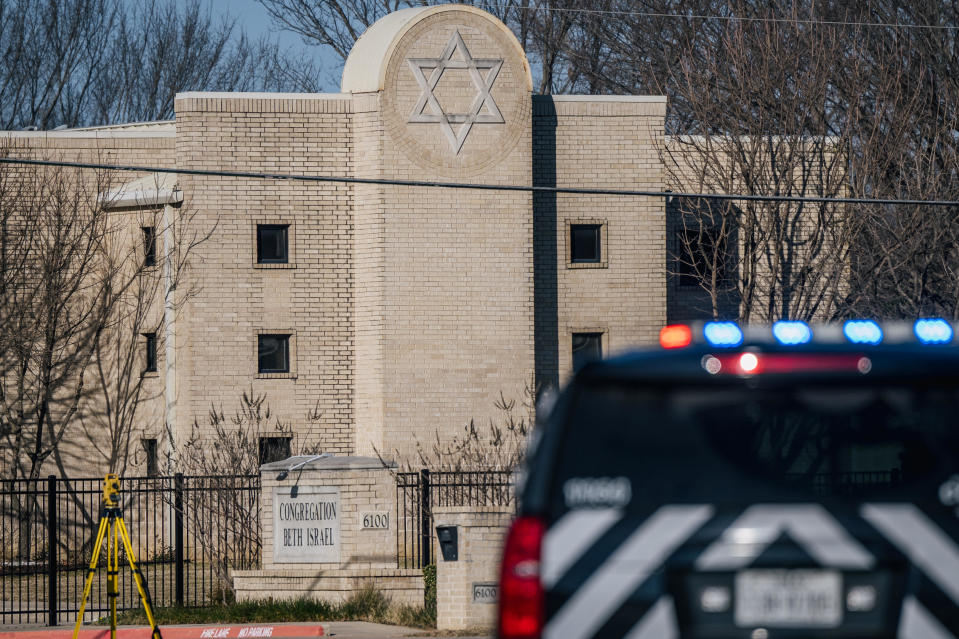Texas hostage standoff raising concerns about "copycat attacks"

The investigation into the gunman who held four people hostage at a Texas synagogue Saturday has increased concern among federal officials about possible "copycat attacks," according to an intelligence bulletin obtained by CBS News.
Separately, police in Manchester, England said Thursday they had arrested two men in connection with the U.S. investigation. The gunman was from Blackburn, north of Manchester. Police did not identify the men, who were detained for questioning in Manchester and Birmingham. No charges were announced.
The joint U.S. bulletin was issued Tuesday to federal, state and local law enforcement partners by the FBI, Department of Homeland Security and National Counterterrorism Center.
Law enforcement sources say, and livestream audio of the incident reveals that the gunman, identified by authorities as 44-year-old British citizen Malik Faisal Akram, repeatedly asked for the release of Aafia Siddiqui, a Pakistani woman serving an 86-year sentence in a federal prison in Texas for trying to kill U.S. officers in Afghanistan.
Audio of the attack was captured on a synagogue live stream of its worship service for approximately the first 40 minutes, according to the joint bulletin. It remains unclear to investigators if the livestream was part of Akram's plan, though federal law enforcement has identified the use of live streaming as a growing trend among violent extremists to try to amplify their attacks both domestically and abroad.
Tuesday's bulletin cautions that "the hostage situation has reinvigorated online discussions, predominantly from … al Qaeda supporters, regarding Siddiqui's detainment."

Although there are "no known specific or ongoing threats to the Jewish community that have been identified related to this attack," the FBI, DHS, and NCTC continue to "urge law enforcement partners to maintain a posture of increased situational awareness," the bulletin says.
"The FBI, DHS, and NCTC also remain concerned about the potential for copycat attacks following this incident due to the volume of online violent extremist messaging advocating for the release of Aafia Siddiqui," the bulletin reads. "Since the attack, open sources have reported online discussions — from a variety of sources, including AQ (al Qaeda) supporters — praising the attack and renewing attention on Siddiqui's imprisonment."
The advisory also points to recent al Qaeda-affiliated attempts to praise Akram and his violent actions. Editors of an al Qaeda-affiliated magazine released a statement Monday, commending and celebrating his actions, the bulletin states.
Since the attack, prominent al Qaeda backers have gone on private and public online sites to call Akram a "brother" and "martyr" for drawing attention to Aafia Siddiqui's cause.
And while mainstream media outlets including Facebook and Twitter have been quicker to remove calls for violence in recent months, extremist actors have migrated to smaller, encrypted platforms such as Telegram, Element and "Rocketchat" to post such messages.
The arrests in England came just hours after a recording — reportedly of a phone call between Akram and his brother during the incident — was published by the London-based newspaper The Jewish Chronicle, showing that his family tried hard to get him to surrender to police.
During the call, which CBS News has not independently verified, the gunman says he wants to die as a martyr and rails against Jewish people and U.S. military action in the Middle East. He also says he's "opening the doors" to further attacks. His brother repeatedly pleads with him to end the attack.
The gunman also said he had "prayed to Allah for two years for this," raising questions about an investigation conducted by British authorities 18 months ago that concluded he didn't pose a risk to national security.
Details on Akram's travel to U.S.
The U.S. bulletin states that Akram came alone to the United States on December 29, 2021, through the U.S. Visa Waiver Program.
His entrance into U.S. was approved by the U.S. Customs and Border Protection's Electronic System for Travel Authorization, or ESTA, according to the bulletin, at New York City's John F. Kennedy International Airport. Tourism visas are not required for British travelers planning to stay in the United States for less than three months.
Akram, who paid for his own flight from the United Kingdom to New York, did not appear on any U.S. terror watch lists, federal law enforcement sources previously confirmed to CBS News. He stayed in New York City for two days before traveling to Texas where, he told family members, he was hoping to find a bride.
During the standoff, one hostage was released, and the bulletin says the three remaining hostages escaped before the FBI's Hostage Rescue Team entered the synagogue.
"At approximately 10:11pm EST, as a tactical team approached to make entry to the synagogue, the hostages escaped and were secured by tactical elements," the memo indicates. "The assault team quickly breached the facility at a separate point of entry and the subject was killed."
Rabbi Charlie Cytron-Walker, who was one of the people taken hostage, told "CBS Mornings" Tuesday that the situation seemed to be deteriorating near the end of the night.
According to the bulletin, Akram "told hostages he possessed guns and bombs and that he was 'not afraid to pull the strings.'"
"I told them to go, I threw a chair at the gunman and I headed for the door," Cytron-Walker recounted. "And all three of us were able to get out without even a shot being fired."
Akram was later found to be in possession of just one firearm, a handgun he said he bought "on the street," according to notes obtained by CBS News of a high-level law enforcement conference call led by FBI director Christopher Wray.
-- Tucker Reals and Haley Ott contributed reporting.
Sneak peek: The Suzanne Morphew Case: Nothing Is What It Seems
Landmark voting rights bill fails in Senate
Vice President Kamala Harris on future of voting rights and one year in office

